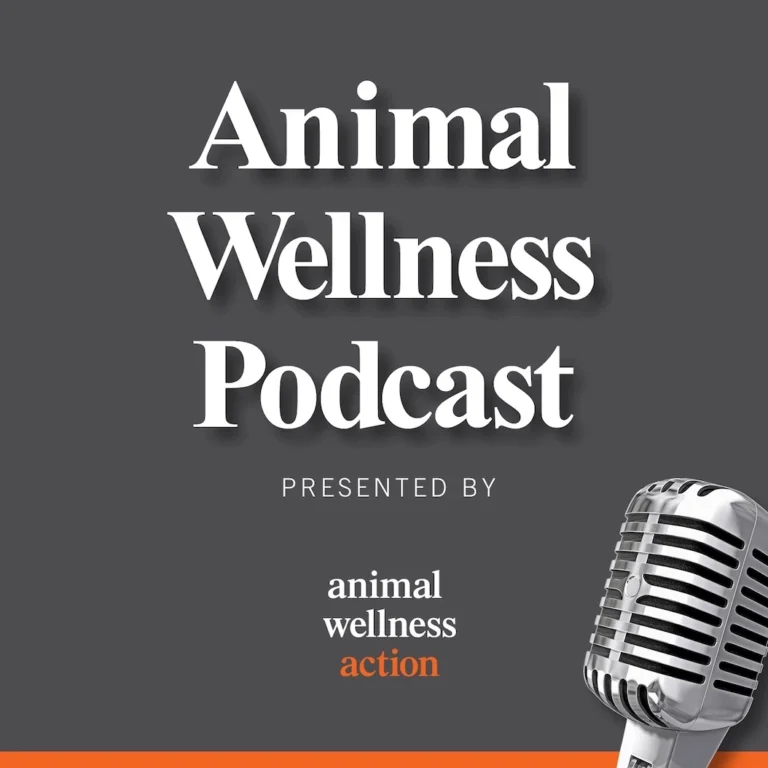
The Animal Wellness podcast is produced by Animal Wellness Action and the Center for a Humane Economy. It focuses on improving the lives of animals in the United States and abroad through legislation and by influencing businesses to create a more humane economy. The show is hosted by veteran journalist and animal-advocate Joseph Grove. Apple Podcasts, Stitcher, Spotify and Podbean offer subscriptions to the free show.
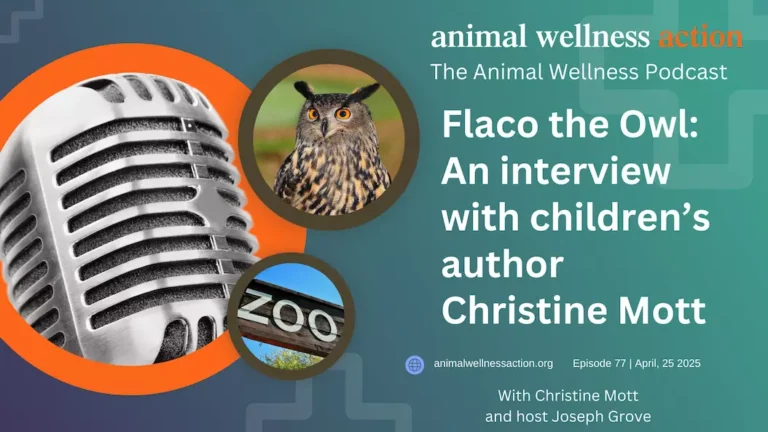
Flaco the Owl: An interview with children’s author Christine Mott Episode 77
Apr. 24, 2025
In February 2023, Flaco — a majestic Eurasian eagle-owl — made headlines after escaping the Central Park Zoo when vandals damaged his enclosure. Born in captivity and confined for more than 13 years, few expected him to survive in the wild. But Flaco defied the odds, becoming a symbol of resilience and freedom as he soared over Manhattan, hunting rats and perching on high-rises — even doing some peeping-tom-ing along the way. His deep hoots echoed through the city, drawing nightly crowds and sparking a social media frenzy.
Flaco’s remarkable year in the wild made him a local legend and New York’s first true “celebrity owl.” But his story ended in heartbreak in February 2024, when he died after striking a building — a tragedy compounded by his exposure to rat poison and avian disease. His death triggered public mourning, renewed calls for wildlife-safe urban policies, and a citywide reflection on the human impact on nature.
In this episode, we talk to Christine Mott. She is the author of the children’s book Free Bird: Flaco the Owl’s Dreams Take Flight, which was illustrated by Ofra Layla Isler and will be released on May 6, 2025. The book is aimed at readers ages 4-8, who will learn the importance of following their dreams and showing compassion for wild animals. Half of the proceeds will be donated to The Wild Bird Fund, a 501c3 that rehabilitates sick, injured, and orphaned wildlife and releases the animals back into the wilds of New York City. We also visit with a 7-year-old who read the book and get his opinion on this inspiring and thought-provoking tale of animal liberty and independence.
The book is available for purchase here. And to learn more about the campaign of Animal Wellness Action to spare barred owls from a government-sponsored plant to massacre them, go here.
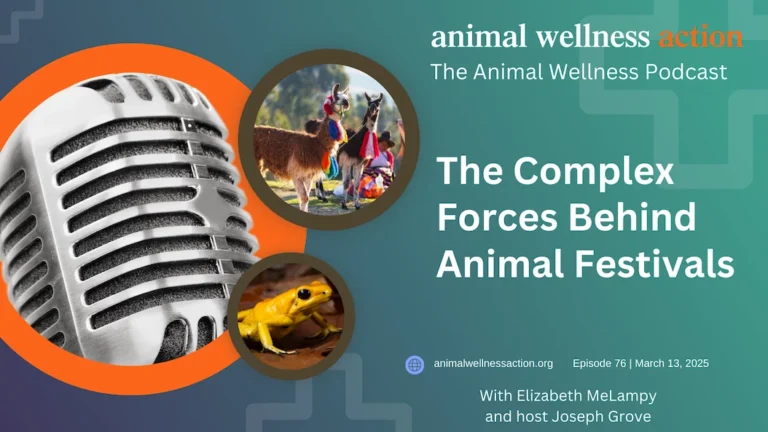
The Complex Forces Behind Animal Festivals | Episode 76
Mar. 13, 2025
From the running of the bulls in Spain to groundhog weather predictions in Pennsylvania, festivals featuring animals exist all over the world. Some are celebrated as cultural treasures, while others are seen as outdated, even cruel. These events often raise difficult questions: Are they harmless fun, or do they exploit animals for human entertainment? Do traditions justify practices that might otherwise be considered inhumane? And perhaps most importantly — can we honor our cultural heritage without harming the very creatures we claim to celebrate?
Our guest has explored these questions firsthand. Elizabeth MeLampy is the author of “Forget the Camel: The Madcap World of Animal Festivals and What They Say About Being Human,” a book that takes readers on a journey across the United States to witness these festivals up close. She traces their histories, examines the ethical dilemmas they present, and asks what they reveal about our relationship with animals — and ourselves.
So today, we’re asking the big questions: What does our use of animals in festivals say about us as a species? Where do we draw the line between tradition and exploitation? And is there a way to celebrate animals without causing them harm?
While in law school, Elizabeth worked on issues related to farmed animals, wild animals, and captive animals with Harvard’s Animal Law & Policy Clinic. She also was in the inaugural cohort of Emerging Scholar Fellows with the Brooks Institute for Animal Rights Law and Policy, where she worked on animal law scholarship. Elizabeth has traveled the country attending these festivals, meeting the people who run them, and grappling with the contradictions they present. We’re excited to hear her insights and discuss what needs to change — and what doesn’t — when it comes to animals in entertainment.
Learn more about Elizabeth MeLampy here, and you can order her book here.
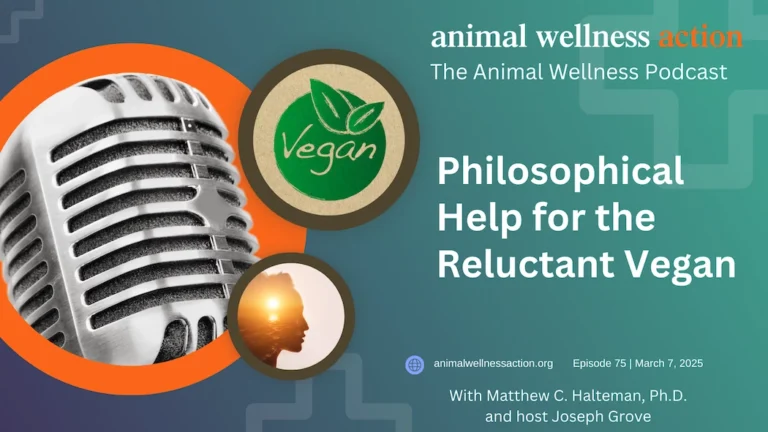
Philosophical Help for the Reluctant Vegan | Episode 75
Mar. 7, 2025
What can a philosopher teach us about veganism and how to make the change when confronted with old habits, latent desires, and an apprehension of the difficulty the adjustment would mean to those who share our dinner tables?
That’s the focus of this episode. Host Joseph Grove talks to Matthew C. Halteman, Ph.D., a professor of philosophy at Calvin University in Grand Rapids, Mich., and a fellow at the Oxford Centre for Animal Ethics in the UK. He is the author of “Compassionate Eating as Care of Creation” and co-editor of “Philosophy Comes to Dinner: Arguments about the Ethics of Eating.” His new book, “Hungry Beautiful Animals,” was released last November and is a heartfelt, humane, and humorous exploration of how going vegan can bring abundance into our lives.
The conversation briefly references various philosophical angles that touch on the issue of veganism but focuses on practical ways to consider making the ethical change to a lifestyle that eschews inclusion of animal-sourced products.
To learn more about “Hungry Beautiful Animals” and Dr. Halteman, visit HungryBeautifulAnimals.com.
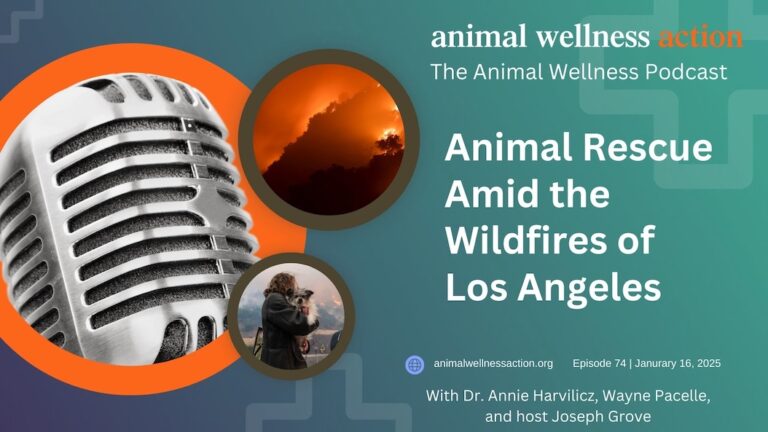
Animal Rescue Amid the Wildfires of Los Angeles | Episode 74
Jan. 16, 2025
This show focuses on the Los Angeles wildfires, what is being done to save domestic and wild animals involved.
As of recording, January 15, the massive blazes in Southern California have killed at least 25 people and destroyed thousands of houses and other buildings. We’ll never know how many animals have been lost since the Eaton Fire and the Palisades Fire began their scorching march across the Los Angeles area just more than a week ago. One national study of disaster response by the ASPCA found that almost 50 percent of survey-takers had left at least one pet home when evacuating, and that about 4 in 10 of them didn’t return home to those animals for at least four days. And understanding the impact of wildfires on non-domesticated animals is sketchy. Not only are the animals prone to being killed by smoke or burned alive, the resulting loss of habitat can mean starvation, brutal fights for new territory, and the disruption of critical animal-family units.
Host Joseph Grove talks to two people actively involved in abating the animal tragedy. He is joined by Dr. Annie Harvilicz, founder of the Animal Wellness Foundation, which is a sister organization to Animal Wellness Action and the Center for a Humane Economy. She is on the ground, using her veterinary skills to treat impacted animals and coordinate placements for imperiled ones. Wayne Pacelle, president of Animal Wellness Action and a veteran of helping animals in the context of natural disasters, is working behind the scenes to procure resources and to make long-term plans for the rehab of wildlife.
To learn more about the Animal Wellness Foundation and to donate to the work, go here.
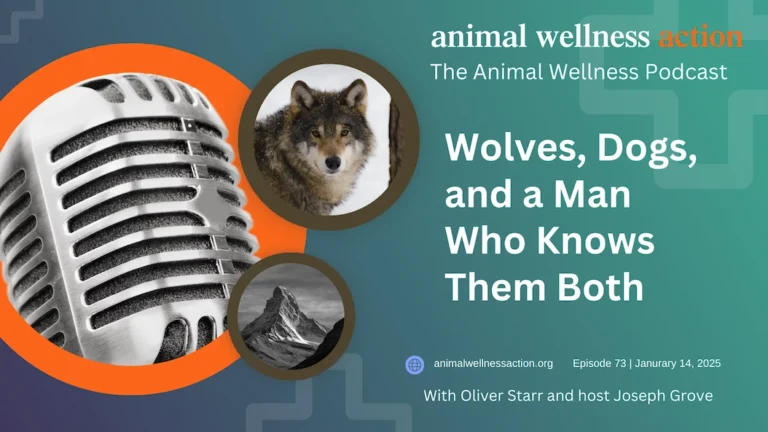
Wolves, Dogs, and a Man Who Knows Them Both | Episode 73
Jan. 15, 2025
Oliver Starr came to our attention when he spoke in an Animal Wellness Action webinar about wolves and stole the show — and the hearts of attendees — by taking his camera out among the small pack of wolves at Tahoe Wolf Center, where he is executive director. His passion and his endearing bond with the animals made us want to learn more.
Starr also is the author of a new book, “The Wolf Lover’s Guide to Raising Dogs,” which explores the powerful link between domestic dogs and their wild ancestors. It offers practical advice for building a joyful, respectful relationship with your dog, enriching both your lives. He discusses some of those lessons — and a thing or two humans can learn about humans, too — in this exclusive interview.
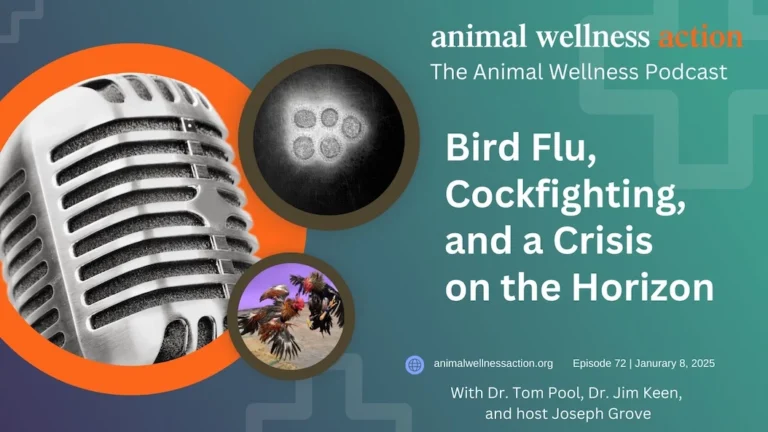
Bird Flu, Cockfighting, and a Crisis on the Horizon | Episode 72
Jan. 8, 2025
The only thing we learn from history is that we don’t learn anything from history. That was the summary comment of host Joseph Grove in a conversation about the federal government’s lackadaisical response to the emergent bird flu crisis. Grove was joined by Dr. Jim Keen and Dr. Tom Pool, who reviewed the progress of the disease in the United States, its spread from birds to cattle and humans, and the possibility — perhaps even the likelihood — that a virulent form will soon emerge that enables fast transmission among people. If that happens, the experts said, the COVID pandemic in retrospect may look mild by comparison.
Also discussed was the importance of passing the FIGHT Act, legislation to be reintroduced in the new Congress that would help eradicate cockfighting in the United States. Cockfighting entails poor standards of bird handling and the movement of potentially infected birds across the country and the world, all in addition to the “sports” inherent animal cruelty and appurtenant crimes of drugs, illegal weapons, illicit gambling, and even human trafficking.
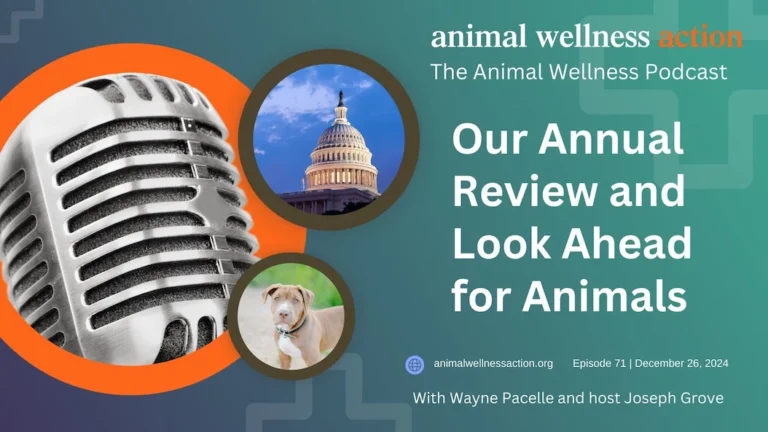
Our Annual Review and Look Ahead for Animals | Episode 71
Dec. 26, 2024
Wayne Pacelle again joins the show as he and host Joseph Grove recount the accomplishments of the past year and how Animal Wellness Action and sister organization Center for a Humane Economy have set things for a successful 2025. Along the way, they discuss the differences among distinct victories, protecting them and ensuring they fulfill their promise for relief for animals, and long-term work that may take years to pay off.
You can read Wayne’s 2024 year-end column by going here.
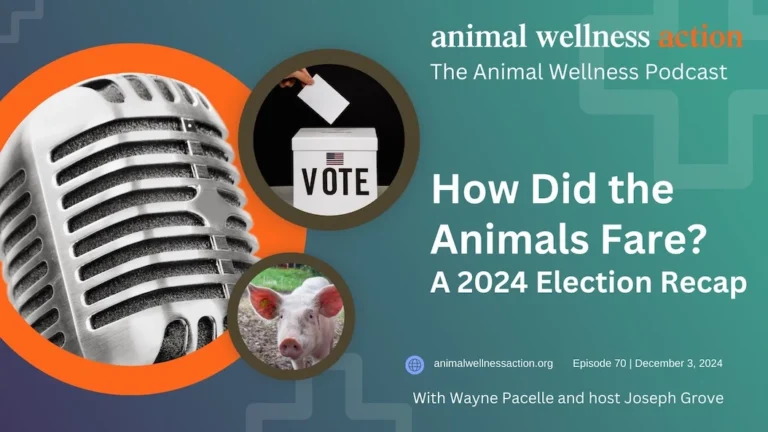
How Did the Animals Fare? A 2024 Election Recap | Episode 70
Dec. 3, 2024
Animal Wellness Action this year intensified its efforts to help elect candidates who vote with animals in mind and to defeat incumbents who don’t. In 2024, the Washington D.C.-based group invested heavily in nine races across the country and prevailed in seven of them.
Wayne Pacelle, president of Animal Wellness Action, recounts the victories in our latest podcast. Joined by host Joseph Grove, he breaks down the races, why they were important for animal welfare, and what the victories mean against the larger political landscape.
Pacelle also reviews the outgoing Biden administration on animal issues and shares his expectations from appointees to the next Trump administration.
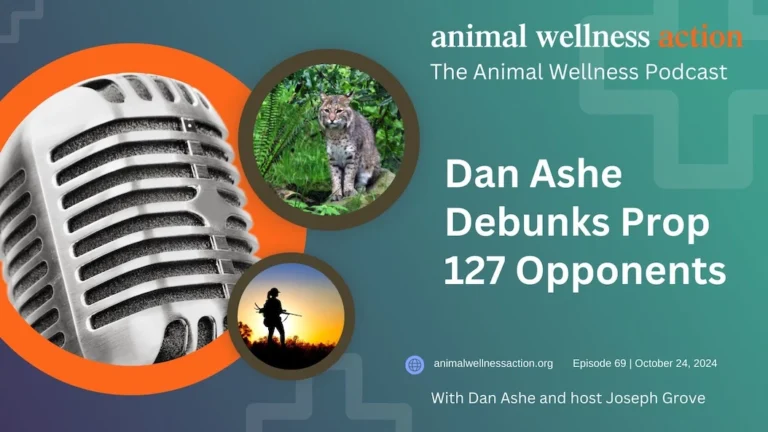
Dan Ashe Debunks Prop 127 Opponents | Episode 69
Oct. 24, 2024
The Proposition 127 ballot initiative in Colorado has garnered national attention even as the presidential election and other national races dominate the headlines. The initiative, launched and supported by the Cats Aren’t Trophies campaign, seeks to modify state law by criminalizing “the intentional killing, wounding, pursuing, entrapping, or discharging or releasing of a deadly weapon at a mountain lion, lynx, or bobcat.”
Host Joseph Grove talks with Dan Ashe, the former director of the U.S. Fish and Wildlife Service and head of its National Wildlife Refuge System. Ashe is a vocal supporter of the Yes on Proposition 127 movement, which some consider ironic given that Ashe is a well-known hunter and proponent of hunting.
Ashe tells Grove that Proposition 127 is actually a pro-hunting initiative, given the self-regulating nature of the big cats and their propensity to cleanse deer and elk herds of animals carrying the devastating Chronic Wasting Disease. Ashe says the methods of trophy hunting — using packs of dogs with high-tech equipment so “hunters” can simply shoot the cats out of a tree — is wholly at odds with traditional “fair chase” principles associated with true hunting and summarizes by saying “trophy hunting isn’t hunting. It’s killing.”
Ryan Luterman-Sevel produced the episode.
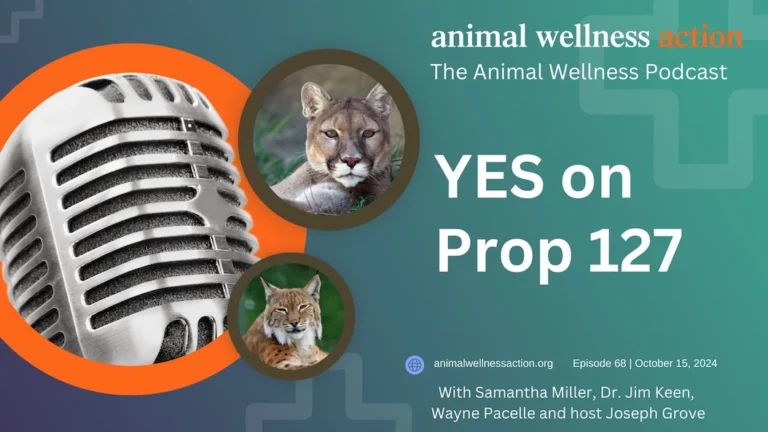
YES on Proposition 127 | Episode 68
Oct. 15, 2024
Animals Wellness Action and the Center for a Humane Economy are members of a broad coalition supporting the Yes on Prop 127 | Cats Aren’t Trophies ballot initiative in Colorado, which would make illegal the cruel, inhumane, and unsporting practice of trophy-hunting mountain lions. The practice is egregious because it uses packs of dogs equipped with telemetry devices to chase the cats up trees, where they remain terrified and unable to escape until a “hunter” shoots them down just to mount them as trophies.
This podcast features several guests. Wayne Pacelle is the founder and president of Animal Wellness Action and the Center for a Humane Economy, has led efforts to pass 1,500 state laws for animals, more than 100 federal laws and amendments, 30 ballot initiatives, and 500 corporate agreements.
Dr. Jim Keen is the head of veterinary sciences for the Center for a Humane Economy. He worked as a veterinary infectious disease and public health researcher at the USDA in Nebraska and at the University of Nebraska for more than 30 years.
The group discussed the necessity of making the change to Colorado law and the role of mountain lions as part of a stable ecosystem and as important checks against the spread of Chronic Wasting Disease.
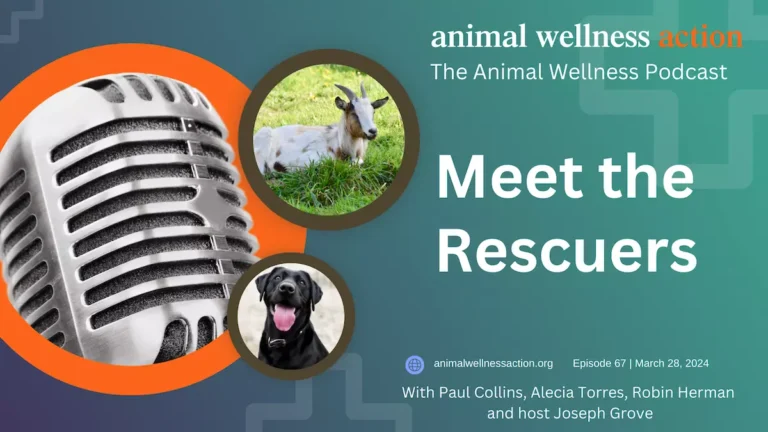
Meet the Rescuers | Episode 67
Mar. 28, 2024
Many of our shows deal with complex legislative and veterinary issues, so every once in a while we like to meet up with people on the ground, deep in day-to-day work with animals. This is one of those episodes. In it, we talk to:
Paul Collins, the Wisconsin state director for Animal Wellness Action. In his free time, he volunteers at a local rescue sanctuary, where he has befriended emus and become a master of cleaning goat stalls.
Alecia Torres, the operations director at Heartland Farm Sanctuary in Wisconsin. Heartland provides specialized care to rescued farm animals, offers empathy-based humane education programs and provides experiential therapy for young people in partnership with our animals to create a mutually supportive space for healing.
Robin Herman, the head of Lucky Dog Retreat Rescue, a non-profit offshoot of a dog daycare she once owned and operated. Robin, through Lucky Dog and her own, private work, has rescued almost 1,400 dogs and placed them in new, loving homes. She tells us about her upcoming Parvo Prevention Project in Indianapolis, where she and other volunteers will try to vaccinate up to 500 or more dogs against the deadly virus.
The message is the same: We rescue animals, but at the same time, they rescue us.
RELATED LINKS
Heartland Farm Sanctuary
Lucky Dog Retreat Rescue
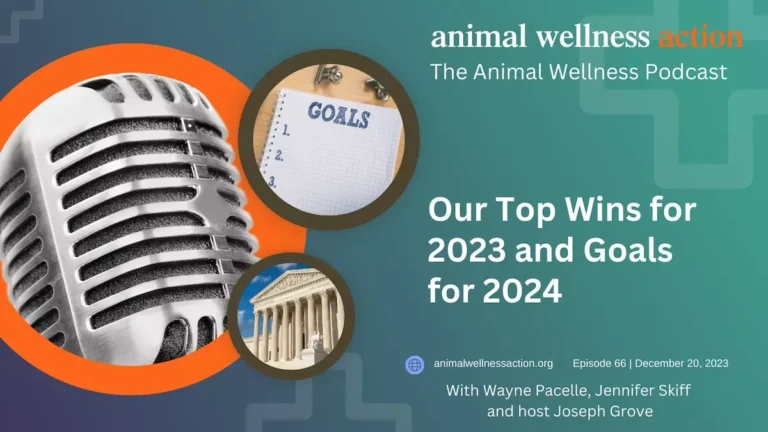
Our Top Wins for 2023 and Goals for 2024 | Episode 66
Dec. 16, 2023
The past year was busy on the animal-wellness front. Not only did Animal Wellness Action and the Center for a Humane Economy see some major wins outside of Congress, we worked to set up major legislative victories for when the 118th Congress returns for its second and final year.
In this podcast, Wayne Pacelle, president of the groups, and Jennifer Skiff, director of international, review those wins and set the stage for 2024. Victories include:
The Supreme Court’s upholding California’s Prop 12 and affirming the state’s right to exclude from its markets products from animals kept in extreme confinement.
The persuasion of Nike, Puma, and New Balance to stop sourcing products from hunted kangaroos.
Developing opposition to the EATS Act, a sinister bill that would undo the ability of states to enact animal-welfare protocols that may impact other states.
The inclusion of animal-welfare standards into the requirements products must satisfy in order to be labeled “organic” — a legally binding designation putting first-ever farm animal welfare rules into federal law.
RELATED LINKS
- Our dedicated Kangaroos Are Not Shoes.
- Scenes from our Global Day of Protest against Adidas.
Scenes from our latest protest in the Don’t Be a Dick’s Campaign.
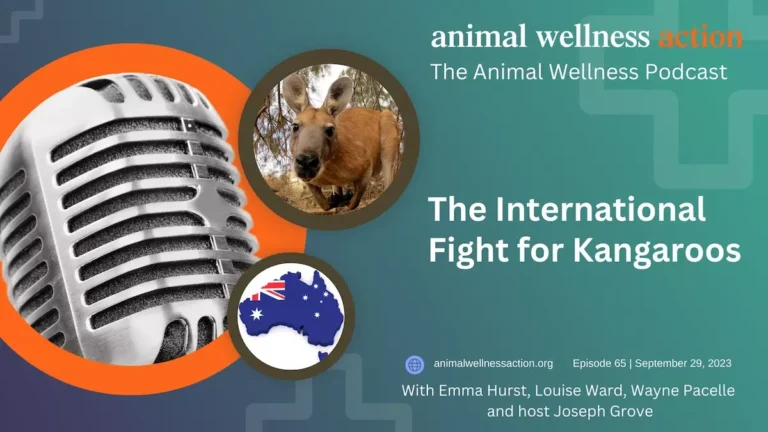
The International Fight for Kangaroos | Episode 65
Sept. 27, 2023
About 1.5 million kangaroos a year are shot, bludgeoned or left to starve to death or die of their injuries. This occurs because companies like Adidas and New Balance still pay hunters to head into the Australian wilderness to hunt the animals. The hunters make the kills, the kangaroos are skinned, and the skins are made into soccer shoes for affluent customers across the United States and other parts of the world.
That’s right. The largest commercial slaughter of terrestrial wildlife is predicated on selling soccer shoes, or cleats, to pros, amateurs and kids who are willing to pay extra merely for the “luxury” of wearing leather from dead kangaroos.
Worse, the slain kangaroos often have joeys in their pouches. The policy for joeys is that they are immediately killed, usually by bludgeoning them against the bumper of the hunter’s truck. Those who don’t meet this fate often escape back into the wild, where they face starvation, dehydration, or being attacked and eaten by other wild animals.
The campaign to stop this horror show is called Kangaroos Are Not Shoes, and here to talk about is Wayne Pacelle, president of Animal Wellness Action and the Center for a Humane Economy. He’ll tell us about progress the campaign has made and what comes next. Also on the show are Emma Hurst, a member of the Australian parliament, representing the Animal Justice Party and Louise Ward, the state director for the party. We had the chance to visit them during a break from their whirlwind visits with U.S. legislators on Capitol Hill.
Listeners can take action for kangaroos by visiting www.kangaroosarenotshoes.org, where you’ll find links to congressional Action Alerts and a petition for the Don’t Be a Dick’s campaign.
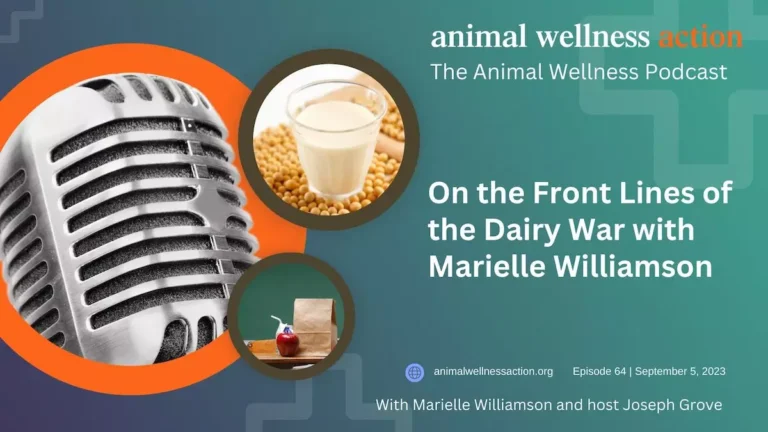
One Teen's Heroic Fight against Dairy | Episode 64
Sept. 12, 2023
Last May, Marielle Williamson was an anonymous teenager doing anonymous teenager things. Like her classmates at Eagle Rock High School in Los Angeles, California, she was busy preparing to graduate and to leap across the threshold into adulthood. The last thing on her mind was becoming the subject of countless news stories and being thrust into a debate about nutrition, animal welfare and the First Amendment. But that’s what happened to her, and that’s the topic of today’s show. We were interested in Marielle’s journey because it intersects with efforts to have Congress pass the ADD SOY Act.
The bill would require the USDA to reimburse schools when they provide soy milk as an alternative to dairy milk in the breakfast and lunch lines. Right now, not only does it require notes and special permission even to receive soy milk instead of dairy, but schools aren’t paid back for the cost of it, the way they are when they serve cow’s milk.
That’s why, whether a kid wants it or not — even if dairy makes the kid sick — her or she gets two cartons of milk with each school-provided meal. Oftentimes, maybe even most times, those cartons end up straight in the garbage, unopened, because their would-be consumers either don’t like milk or have a physical aversion to it, usually in the form of lactose intolerance. Not only is the practice harmful to children who don’t know they are lactose intolerant and drink the dairy, or who drink it despite the many health concerns surrounding dairy, it represents a remarkable waste of tax-payer dollars.
To learn more about the need for the ADD SOY Act, watch our special webinar featuring Wayne Pacelle, president of Animal Wellness Action and the Center for a Humane Economy; Dotsie Baush, executive director, Switch4Good; Dr. Lakshman (Lucky) Mulpuri, chief executive, PlantsNourish; and Rep. Troy Carter, who introduced the legislation. You can view it here.
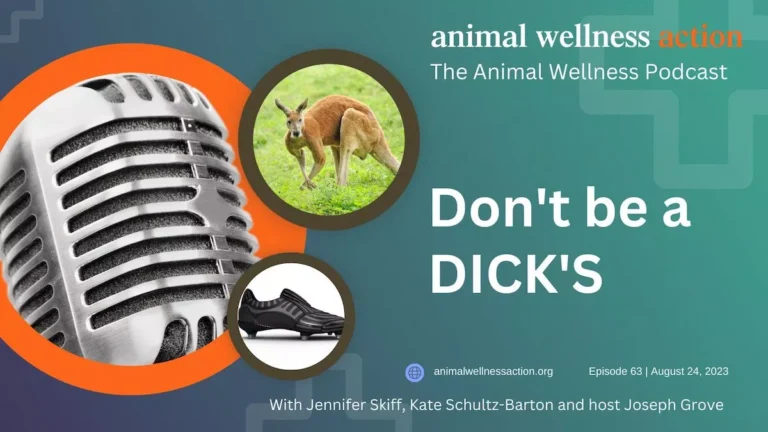
Don’t Be A Dick’s! | Episode 63
Aug 31, 2023
That’s the message of a new campaign initiative by Animal Wellness Action and its sister organization, the Center for a Humane Economy. It’s targeted at Dick’s Sporting Goods, the largest sporting-goods retailer in the United States, to call attention to the chain’s role in the largest commercial slaughter of land-based wildlife in the world.
Dick’s Sporting Goods remains a significant reseller of shoes sourced from killed kangaroos. Several models from Adidas, New Balance and other brands are marketed in their more than 750 physical locations and on its website, patronized by millions of shoppers across the globe.
The hunting of kangaroos is barbaric and, given the availability and superiority of synthetic shoe material, needless. What’s worse, in addition to the approximately 1.7 million kangaroos shot in the dead of night each year, about a half a million joeys are killed as collateral damage. The infants are pulled from the pouches of their dead mothers and killed immediately, usually by being bludgeoned to death against the bumper of the assassins’ trucks.
The two groups have been successful, after years of online and instore protests, in persuading Puma and Nike to stop manufacturing shoes from kangaroo parts. Now they hope to apply pressure against the hold-out brands by expressing their revulsion against this major reseller.
Joining host Joseph Grove are Jennifer Skiff and Kate Schultz Barton. Skiff is the director of international programs for the organizations. A dual citizen of Australia, she shares firsthand knowledge of kangaroos, their nature and role in Australian culture. Barton, senior attorney for the organization, led several suits brought against retailers in California who illegally sold kangaroo-sourced shoes. Barton discusses the newly filed Kangaroo Protection Act, H.R. 4995.
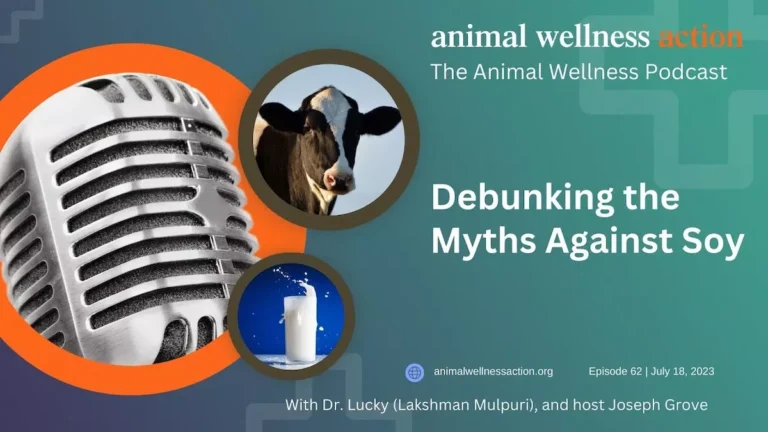
Debunking the Myths Against Soy | Episode 62
Aug 16, 2023
Animal Wellness Action is one of many organizations pushing for Congress to pass the ADD SOY Act, a bill that would require the USDA to make soy milk available as a beverage alternative to the 30 million children who are part of the National School Lunch Program.
Every year, about $300 million in cow milk is tossed into the garbage — much of it still in unopened containers — by children who don’t like the taste of it or, owing to lactose intolerance, cannot drink without suffering cramps, bloating, diarrhea, vomiting and more. But unless a school puts two cartons of milk on the tray, the school will not be reimbursed for the cost of the meal.
It’s bad for kids. It’s bad for taxpayers. And it makes a mockery of the suffering of dairy cows, who lead truncated lives characterized by exploitation only to have their milk end up in the trash.
One would expect Big Dairy to be opposed to the ADD SOY Act, but another foe is making progress a challenge: the widespread misinformation about soy and the false beliefs about its safety.
In this episode, Dr. Lakshman “Lucky” Mulpuri, a medical advisor for Animal Wellness Action, visits the show to debunk the common myths impeding broader adoption of soy milk as an alternative to cow milk. He is chief executive of PlantsNourish and former president of the Plant-Based Nutrition Group (PBNG). He also developed and implemented the first-ever mandatory plant-based medical curriculum for first-year medical students at Wayne State. His work has been featured in VegNews, Forks Over Knives, and numerous newspapers and television stations.
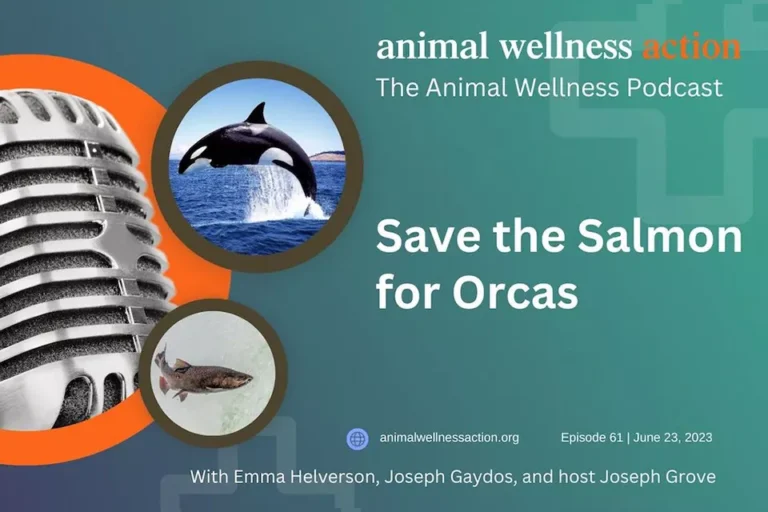
Save the Salmon for Orcas | Episode 61
June 23, 2023
For decades, a wide range of man-made and environmental threats have endangered Southern Resident Orca — thinning the population in the Pacific Northwest to only 73. Today, they’re looking directly at extinction.
The urgency of the orcas’ plight cannot be overstated. While many agencies and organizations are working to save our orca through scientific research, mitigation programs, public policy initiatives, and political action, these efforts have fallen short and the orca simply can’t wait. The show is about how each of us can help make a difference simply by NOT ordering a particular item off the menu.
In this 61st episode of the Animal Wellness podcast, host Joseph Grove talks with Emma Helverson and Joseph Gaydo. Helverson, executive director of Wild Fish Conservancy, in Washington, shares her organization’s efforts to protect the Southern Resident orca from one of the many threats facing them — starvation. Gaydo, science director for the SeaDoc Society, talks about the complex personalities, culture and thinking exhibited by all orcas, including the Southern Resident, and how humans’ nonchalance about their well-being is having a catastrophic impact.